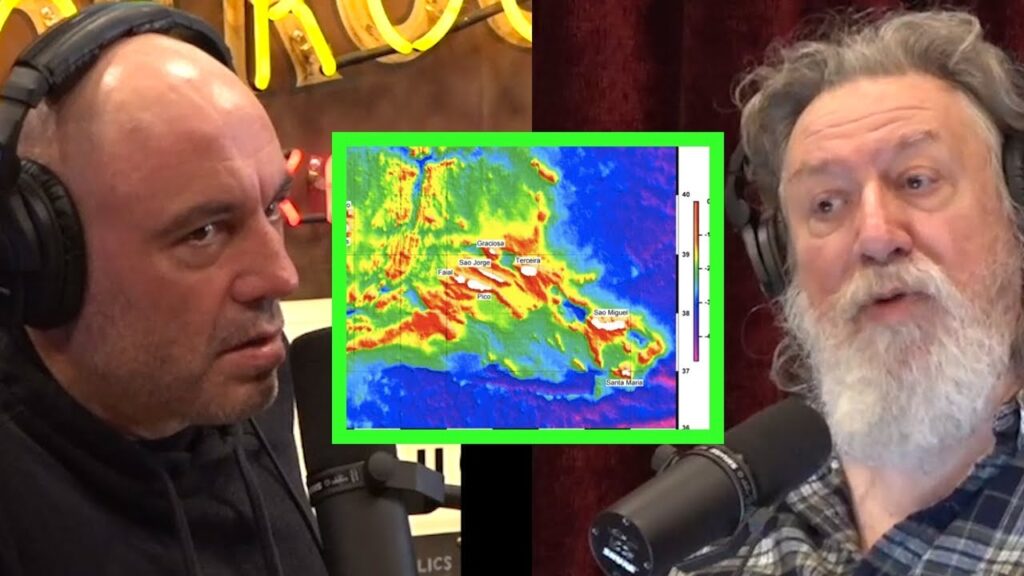The legend of the lost city of Atlantis has captivated the minds of people for centuries. In a recent episode of the Joe Rogan Experience, guest Randall Carlson, a renowned geological and anthropological theorist, shed light on the possibility that the sunken Azores Plateau might be the location of this fabled ancient civilization. In this article, we delve into the evidence and insights presented during their discussion and explore the potential link between the Azores Plateau and the lost city of Atlantis.

The Sunken Azores Plateau: A Geographical Marvel
Located in the North Atlantic Ocean, the Azores Plateau is an underwater landmass that straddles a triple plate junction between the European, African, and North American tectonic plates. The plateau is characterized by its sunken seamounts, which are flat-topped underwater mountains that have been sheared off. The intriguing geological features of the Azores Plateau have led some researchers, including Randall Carlson, to believe that it could potentially be the site of the lost city of Atlantis.
Isostatic Compensation and the Sinking of the Azores Plateau
One of the main reasons behind the hypothesis that the sunken Azores Plateau could be the location of Atlantis is the evidence of isostatic compensation in the region. Isostatic compensation refers to the vertical movement of the Earth’s crust in response to changes in the weight of glaciers. As glaciers melt, the weight on the Earth’s crust is reduced, causing the land to rise. Conversely, as glaciers grow, the weight on the Earth’s crust increases, causing the land to sink.
In the case of the Azores Plateau, Randall Carlson presented evidence of significant subsidence along the Mid-Atlantic Ridge during the Late Pleistocene era. This was likely due to the melting of glaciers, which resulted in a rise in sea level and the subsequent sinking of the plateau. Fossil evidence, such as the presence of shallow water marine creatures found miles below sea level, further supports this theory.
Plato's Account of Atlantis and the Azores Plateau
The ancient Greek philosopher Plato is one of the main sources of information about the lost city of Atlantis. In his works, he described a maritime civilization with advanced navigational abilities that existed beyond the “Pillars of Heracles” (modern-day Strait of Gibraltar). While there is no direct evidence linking the Azores Plateau to Plato’s account of Atlantis, some intriguing parallels can be drawn.
Firstly, the geographical location of the Azores Plateau, situated west of the Strait of Gibraltar, aligns with Plato’s description of Atlantis being located beyond the Pillars of Heracles. Additionally, the evidence of isostatic compensation in the region suggests that a significant portion of the plateau was above sea level during the Late Glacial Maximum, providing a potential landmass for an advanced civilization to inhabit.
The Leap of Faith: A Maritime Civilization in the Ice Age
While the geological evidence presented by Randall Carlson is certainly intriguing, there remains a significant leap of faith in associating the sunken Azores Plateau with the lost city of Atlantis. This leap of faith involves the assumption that an Ice Age civilization had the navigational skills to sail from Europe to the islands of the Azores Plateau.
This assumption is not entirely far-fetched, as ancient maritime cultures such as the Minoans and the Phoenicians were known for their advanced navigational abilities. If a similar or even more advanced civilization existed during the Ice Age, it is possible that they could have reached and inhabited the Azores Plateau.
While there is no definitive proof to confirm that the sunken Azores Plateau is indeed the location of the lost city of Atlantis, the geological and geographical evidence presented by Randall Carlson certainly adds a new dimension to the ongoing debate surrounding this ancient mystery.
Conclusion
The legend of the lost city of Atlantis continues to captivate the imagination of people worldwide. While the sunken Azores Plateau may not provide definitive proof of the existence of this fabled civilization, the geological evidence and geographical location of the plateau offer a compelling new perspective on the search for Atlantis. The possibility of an advanced maritime civilization inhabiting the Azores Plateau during the Ice Age, coupled with the intriguing parallels between Plato’s account of Atlantis and the features of the plateau, make this hypothesis worthy of further exploration and study.
As researchers continue to uncover new evidence and insights into the mysteries of our planet’s past, the quest to unravel the enigma of the lost city of Atlantis will undoubtedly continue. Whether or not the sunken Azores Plateau holds the key to this ancient puzzle remains to be seen, but the ongoing debate serves as a testament to the enduring fascination with the unknown and the desire to uncover the secrets of our world’s history.
